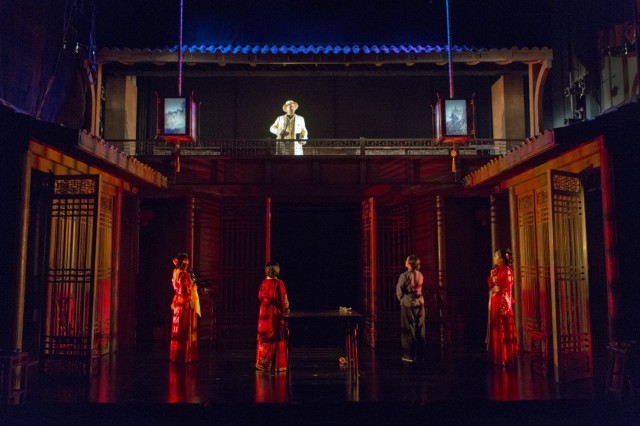
David Henry Hwang’s GOLDEN CHILD is in need of revival at the Signature Theatre (photo by Richard Termine)
The Pershing Square Signature Center
The Alice Griffin Jewel Box Theatre
480 West 42nd St. between Tenth & Eleventh Aves.
Through December 16, $75
212-244-7529
www.signaturetheatre.org
Last year, Tony-winning playwright David Henry Hwang (M. Butterfly) teamed up with Obie-winning director Leigh Silverman (In the Wake, Go Back to Where You Are) and actress Jennifer Lim on the Broadway hit Chinglish, a charming comedy about an American businessman who arrives in a small town in China ready to make a deal but is beset by communication and language issues. The three are together again for the Signature Theatre’s revival of Hwang’s Obie-winning, Tony-nominated Golden Child, but the results this time are far less successful. Based on his own family history and a visit he made to his maternal grandmother when he was ten, Golden Child begins in 1968 Manila, as an American-born Chinese teenager (Greg Watanabe) gets ready to interview his grandmother, Eng Ahn (Annie Q), on a tape recorder. While he wants to talk about the history of the family, she wants to focus on Jesus and Christianity. The play then flashes back to Fujian, China, in 1918, as Eng Tieng Bin (Watanabe) is returning from three years working abroad. Waiting for him are his three wives: first wife Eng Siu-Yong (Julyana Soelistyo, who originated the title role in the 1998 Broadway production), a traditionalist who follows the rules of decorum; second wife Eng Luan (Lim), a manipulative woman with a master plan; and third wife Eng Eling (Lesley Hu), who is not as familiar with accepted protocol but is the most passionate of the trio. The three women, as well as Eng’s only daughter, Ahn (Annie Q), quickly learn about his travels, including his newfound interest in Christianity, made more apparent when a marble-mouthed British missionary, Reverend Baines (Matthew Maher), stops by for a visit. Golden Child examines such themes as ancestral worship, foot binding, Confucianism, Jesus, and bragging about one’s accomplishments, but Silverman’s stolid direction, the rather lackadaisical acting, and the tepid and didactic dialogue turn the play into a history lesson that sacrifices dramatic conflict and nuance in favor of educating the audience about the Westernization of modern China and the Asian-American experience in the new world. Class is in session, but not even a very interesting one at that. Perhaps the Signature will have better luck in February when Hwang, its new Residency One Playwright, returns with a revival of his 1981 show, The Dance and the Railroad.